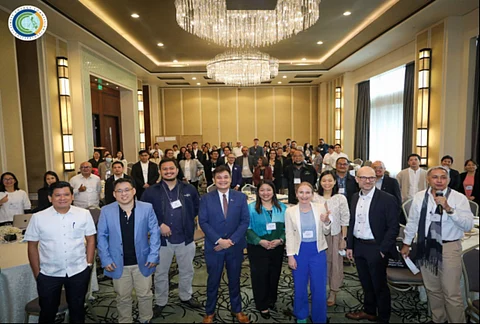
- NEWS
- the EDIT
- COMMENTARY
- BUSINESS
- LIFE
- SHOW
- ACTION
- GLOBAL GOALS
- SNAPS
- DYARYO TIRADA
- MORE

Manila — The Transformative Actions for Climate and Ecological Protection and Development (TRANSCEND) Project, a joint initiative between the Federal Republic of Germany through the International Climate Initiative (IKI) and the Republic of the Philippines, launched with a convergence workshop on 13 January and the First Project Steering Committee (PSC) meeting on 14 January.
The convergence workshop aimed to align the project's goals with government priorities. It brought together the project consortium, implementing partners, and government stakeholders, including the Climate Change Commission (CCC), the Department of Environment and Natural Resources (DENR), the Department of Human Settlements and Urban Development (DHSUD), the Department of Trade and Industry (DTI), the Department of Transportation (DOTr), the German Federal Ministry for Economic Affairs and Climate Action (BMWK), the German Federal Ministry for the Environment, Nature Conservation, Nuclear Safety and Consumer Protection (BMUV), and Zukunft – Umwelt – Gesellschaft gGmbH (ZUG), which oversees IKI program management.
CCC Vice Chairperson and Executive Director Robert E.A. Borje highlighted the project’s potential to make a real impact on communities and protect ecosystems.
“Let us remember that our work through TRANSCEND covers the core values, needs, and interests of our people. Through TRANSCEND, we are focused on transforming these into core strengths to secure a resilient future for our people,” Borje said.
The PSC meeting, co-chaired by CCC Commissioner Rachel Anne Herrera and DENR Undersecretary Analiza Rebuelta Teh, centered on future milestones and the project's steering structure.
Commissioner Herrera emphasized the need for collaboration to meet TRANSCEND's goals.
“TRANSCEND is more than a project – it is a catalyst for transformative change toward a climate-resilient, low-carbon, and biodiversity-friendly Philippines. Through our collective wisdom and decisive action today, we set the strong foundation for this ambitious journey,” Herrera said.
Undersecretary Teh pointed to the project’s whole-of-government and whole-of-society approach, shown by the variety of sectors represented in the committee.
“There is an urgent need to strengthen the whole-of-government and whole-of-society approach to adopt actions that would lead the Philippines toward climate resiliency. As evidenced by your presence in today’s Project Steering Committee meeting, TRANSCEND is designed to work across different sectors and targets a multi-level governance approach,” Teh said.
This vision was captured in a joint statement developed by the project, which committee members adopted through a signing ceremony.
TRANSCEND Program Manager Johanna Sibbert presented the joint vision statement, which she said would guide their efforts. “May the image of an inclusive, equitable, climate-resilient, and nature-positive future inspire us to act collectively for climate action,” Sibbert said.
The TRANSCEND Project, which will run from 2024 to 2029 with a total funding of €32.7 million, aims to help the Philippines transition to a climate-resilient, low-carbon, and biodiversity-friendly society. It aligns with national and international climate and biodiversity goals, contributing to the National Adaptation Plan (NAP), the Nationally Determined Contribution (NDC), and the Philippine Biodiversity Strategy and Action Plan (PBSAP).
The project is implemented by a consortium that includes Deutsche Gesellschaft für Internationale Zusammenarbeit (GIZ) GmbH, Conservation International Philippines Foundation Inc. (CIPFI), Rare, the United Nations Human Settlements Programme (UN-Habitat), and the United Nations Industrial Development Organization (UNIDO).
The project also receives targeted support from the Foundation for the Philippine Environment, Wuppertal Institute, International Council for Clean Transportation, Clean Air Asia, Climate Analytics, Institute for Climate and Sustainable Cities, and the University of the Philippines Center for Women’s and Gender Studies.
